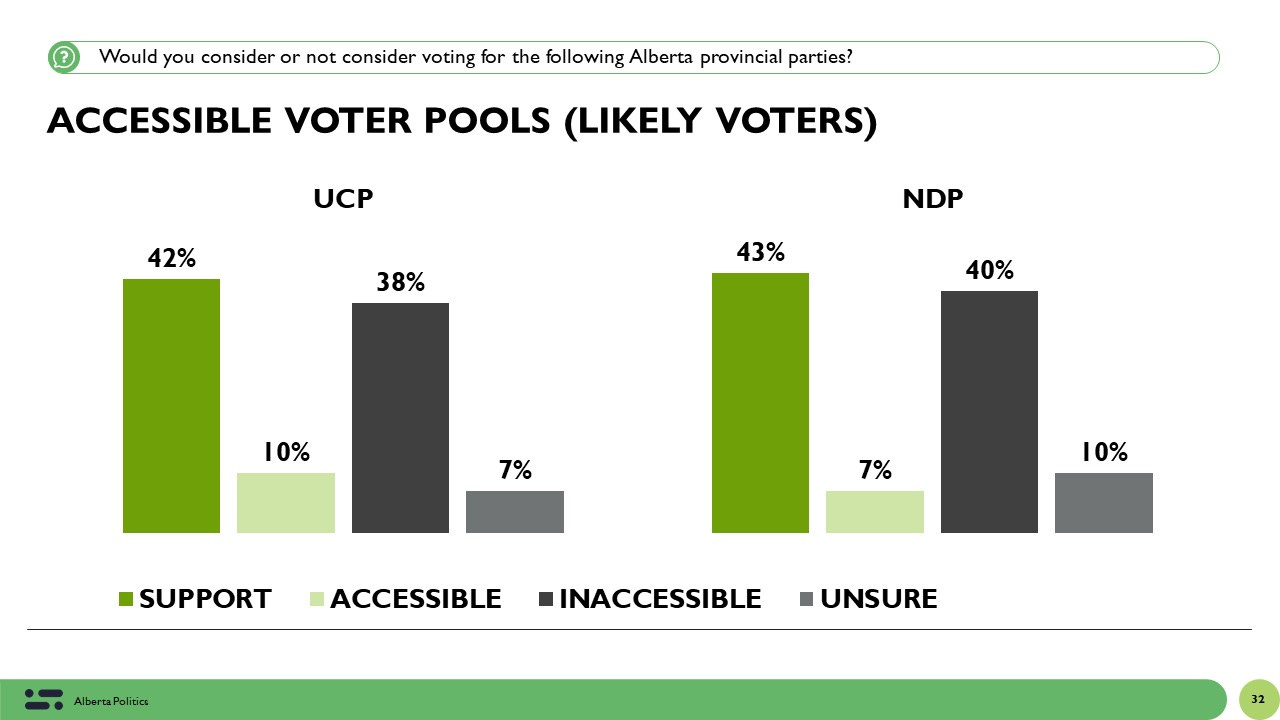Alberta Election: The UCP and NDP are deadlocked, but here’s why I think the UCP is still the favourite to win.
Four reasons why I'd bet on a UCP win today
For the entire Alberta election, I’ll be writing and sharing data exclusive to paid subscribers of this newsletter. For those who aren’t subscribers, you’ll be able to read some of my analysis, but to get everything, including far more data, please subscribe for just $10/month. That helps pay for the data I use in these analyses.
On Wednesday, my polling firm Abacus Data released the first report from our pre-election Alberta survey. We surveyed 1,000 eligible voters from April 21 to 25.
That report showed that the UCP and NDP are deadlocked at 36% apiece province-wide and statistically tied among those most likely to vote.
Not only is the election extremely close but we haven’t seen much change in aggregate vote intentions over the past few months.
As Albertans head towards the start of the official campaign period, I’m increasingly convinced that the UCP holds the advantage and should be considered the favourites at this point. Obviously, the campaign could change this – especially given that 9% of likely voters say they remain undecided.
Here’s how I come to that conclusion:
Reason #1: Alberta is naturally a Big-C conservative province.
Under normal circumstances, a united conservative party in Alberta should not be at risk of losing an election. Albertans are naturally inclined to vote for conservative parties. While they may not be ideologically conservative, they are politically conservative.
What makes 2023 so different and why the UCP could lose is that Danielle Smith is UCP leader and Rachel Notley leads the NDP. Danielle Smith makes many conservative-oriented voters (think the old PC voters) uncomfortable and Rachel Notley makes voting NDP a possibility for some Albertans who would never otherwise consider it.
Alberta is naturally a tough place for the NDP to win against a united conservative party. In this election, it needs to convince many people who have never voted NDP in their lives, to vote NDP this time. It needs to find and mobilize people who didn’t vote NDP in 2015 or in 2019 and vote NDP in 2023. That’s not easy, especially in a province where the natural tendency of most voters is to support Big C conservative parties.
Reason #2: The UCP has a bigger accessible voter pool.
In our April survey, we asked respondents whether they would be open or not to voting for the main political parties in Alberta.
Among all eligible voters, 51% are open to voting UCP and 46% are open to voting for the NDP. The fact that the UCP’s voter universe is only 51% is proof that Smith has alienated many past conservative party voters. The fact that almost half of Albertans are open to voting NDP is both a testament to what Rachel Notley has done to make the NDP acceptable and how Smith has repelled people into the NDP’s camp.
Now, among the more important likely voter group (the 65% of our sample who say they will definitely be voting in the election), the UCP accessible voter pool is 54% while it’s 50% for the NDP.
If we take into remove those who are already committed to one party, we’re left with an accessible pool of 10% for the UCP and 7% for the NDP. In short, the UCP has a larger pool to pull from and more opportunities to find those percentage points of votes it needs to seal the deal.








